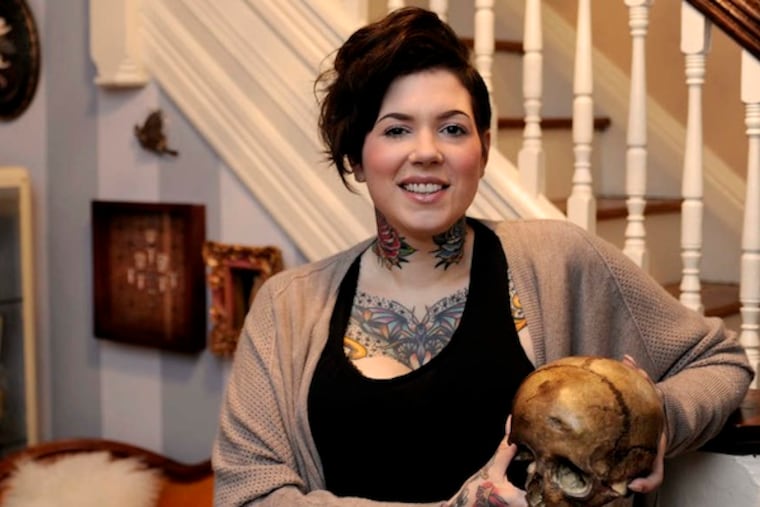Human dissections on Instagram, courtesy of a local pathologist's assistant
Nicole Angemi dissects human bodies for a living, so she routinely sees diseased lungs, brains, ulcerated colons, and severed limbs.

Nicole Angemi dissects human bodies for a living, so she routinely sees diseased lungs, brains, ulcerated colons, and severed limbs.
She wants everyone else to be able to see such things, too.
Angemi, a pathologist's assistant at a Philadelphia-area hospital that she declines to name, posts graphic images several times a day to her Instagram account, which boasts 245,000 followers.
"It's hurting my stomach," one wrote next to a recent photo of a skull cut open to reveal the brain.
"Grossssss," commented another next to a recent photo of an arm mangled in a piece of machinery.
"I find this so beautiful," a fan wrote alongside an image of the heart from a miscarried fetus.
Asked whether any of the photos were of patients on her dissecting table, Angemi hesitated.
A few images come from other sources in her field, and she labels them accordingly. Some are photos she takes of organs from donated cadavers in the gross anatomy lab at Drexel University, where Angemi teaches students seeking to join her profession.
And the rest?
"Just say that I post them," she said.
Angemi said she took great pains not to show tattoos or other details that might identify a patient, as that would violate privacy laws.
She realizes some people will find the images troubling but said the educational value should outweigh any concerns. She spoke passionately during an hour-long interview in the foyer of her Merchantville home, where she keeps the placenta from the birth of her daughter, now 2, in a jar on the mantel.
People need to see what really goes on in medicine, rather than rely on a stream of jargon from a physician rushing off to see another patient, Angemi said.
"Regular people have a right to learn," she said. "Obviously, there is an interest for it because I have so many followers."
It all began when Angemi was a single mom at 19 and looking for a career. She took some pre-nursing classes then realized she was drawn more to the laboratory, eventually earning a bachelor's degree in cytotechnology - the study of cells - at Thomas Jefferson University.
She was hired at Jefferson, only to realize she was even more interested in the hospital's nearby pathology lab, where autopsies are performed. She got a job there doing small dissections like gallbladders and helping with frozen tissue samples while going back to school at Drexel to become a full-fledged pathologist's assistant.
People with that title dissect bodies and organs and prepare tissues for examination under the supervision of a pathologist, a physician. Angemi said she worked at Jefferson for more than a decade, leaving in September 2012.
John L. Farber, a Jefferson pathologist who was at the hospital during Angemi's tenure, said he was unaware of her Instagram photos. Stressing that he spoke for himself and not the hospital, he said he had no personal problem with the idea of posting such photos, as long as privacy is strictly safeguarded.
"If she has acquired a following, obviously there are people who find it interesting," Farber said. "But I can imagine that some people might get upset."
Arthur L. Caplan, a medical ethicist at New York University's Langone Medical Center, was less forgiving. Even if patients' names and other details are not shown, someone might still recognize a body part, he said.
"People who are close can often recognize someone's hands," said Caplan, formerly of the University of Pennsylvania. "Why do this? It will be seen by many as poor taste and a violation of their loved one's dignity."
Told of the educational information Angemi includes, such as descriptions of what smoking does to the lungs, Caplan said that helped "a tiny bit."
Among the images that draw the most attention from followers are those of fetuses (from miscarriages, not abortions). Angemi said her goal was to show women that miscarriages are a common experience.
"I think a lot of women feel very isolated when it happens," she said. "I like to open discussion. I try to post it a lot just to show how frequent it is."
Addressing concerns about privacy, she recently posted a photo of a kidney to show followers there was no way they could identify who it came from. Turns out it was from a dog.
In between the photos of body parts are occasional images of Angemi's children and her husband, Gabriel, a Camden firefighter. They were married last year at a venue with its own trove of body parts: the Mütter Museum of the College of Physicians of Philadelphia.
Angemi has admirers around the world. One is Chelsea Bentley, a biochemistry student at Griffith University in Australia, who calls the Instagram account "really quite fantastic."
"It's all done very respectfully," Bentley said in a phone interview. "It's for the education. It's all her sharing her passion."
Angemi said that she started posting on Instagram a year and a half ago, and that her account had been deleted several times due to complaints.
She is determined to keep posting, under the handle mrs_angemi.
"People are visual," she said. "They need to see pictures of stuff."
215-854-2430
@TomAvril1